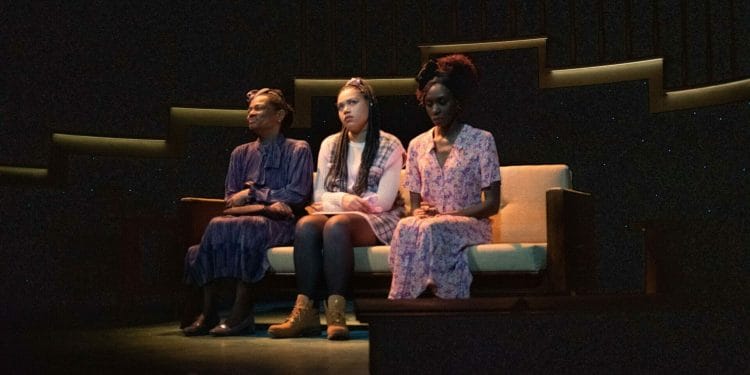 Despite being a bit of a curate’s egg, it is easy to understand why Talawa’s artistic director, Michael Buffong has decided to give a platform to Sian Carter’s debut play Running with Lions, which empathetically portrays a multi-generational British Jamaican family grappling with unresolved grief and mental health issues.
Despite being a bit of a curate’s egg, it is easy to understand why Talawa’s artistic director, Michael Buffong has decided to give a platform to Sian Carter’s debut play Running with Lions, which empathetically portrays a multi-generational British Jamaican family grappling with unresolved grief and mental health issues.
Marking the 35th anniversary of Talawa Theatre Company, Running with Lions is based on an audio play originally commissioned by BBC Radio 4. (Broadcast 7th May 2021 and still available on BBC Sounds).
Advancing the play’s further development, the Lyric Hammersmith Theatre and Talawa Theatre have joined forces for the first time ever to co-produce this stage version of Running with Lions.
The play opens with a flashback scene set in 2004, where teenage brother and sister Gloria and Joshua optimistically discuss their futures, as she prepares to move out of their parents’ house to live with her boyfriend, and Joshua has a promising career ahead of him as an artist. Flash forward 16 years later, and Joshua has been killed in a hit and run accident, and Gloria is just about to return home from yet another extended stay in a mental health unit.
Gloria’s daughter, Imani, has been staying with her Windrush generation grandparents, easy-going preacher Maxwell and strait-laced wife Shirley, who are unwilling to discuss Joshua’s passing or Gloria’s bi-polar illness.
‘Mental health’ is whispered by the elders like a guilty secret, and is most certainly not a subject ever to be shared openly with the local community, especially as “the gospel can hear you”.
Running with Lions has some cumbersome structural flaws. The writing is occasionally plodding and uneven, and some scenes lack pace, making the play feel a little too long. Setting aside these issues, Carter’s play is an impressive debut piece that offers a very realistic picture of complex family dynamics in a time of crisis.
The characters are well-rounded and the non-communication between the family often spot-on, with much of Carter’s dialogue cleverly intertwining with the things the protagonists purposely do and do not say to protect their emotions.
Wil Johnson as Maxwell the father, and family peacemaker, brings much needed light relief and shade to the piece, while Suzette Llewellyn as his staunch wife, Shirley, unerringly portrays a woman who uses her need to control everything to hide her real fears and guilt. Velile Tshabalala passionately relays the frustrations of her character Gloria within the trenchant familial confines, and Ruby Barker convincingly displays vulnerability in a heartfelt speech about her experience of living with a mother who throughout her childhood has been routinely in and out of mental health wards.























